Faith & People
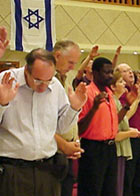 Marranos in Reverse?
Marranos in Reverse?Tuesday, March 9, 2010 | Jewish Ideas Daily » Daily Features
At first blush, the blog reads like any modish commentary on the weekly Torah portion, complete with knowing references to the Mishnah and the building of the Tabernacle in the desert. Only upon closer examination does it become evident that the discussion of the tabernacle as a medium for drawing nearer to God is a precursor to the claim that, nowadays, God can be worshipped "directly." The blogger is a follower of "Yeshua"—a Jewish believer in Jesus. In Jewish eyes they are apostates, but a group of "Messianic Jews" living in Israel say they follow authentic Jewish lives in the footsteps...
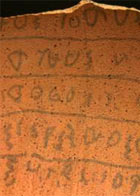 Words
WordsMonday, March 8, 2010 | Jewish Ideas Daily » Daily Features
One of the potentially deleterious effects of the digital revolution is a flattening of consciousness—or so some fear. What sort of leveling takes place as we click relentlessly through the endless web? At what point do the words—thoughtful, meaningless, moving, inane—all bleed together? How to maintain any sense of the preciousness of language itself? Several texts recently come to light manage, each in its own way, to remind us that a whole, irreplaceable world can rest in a few furtive lines found who knows where. Phrases inked on pottery discovered at an excavation in Israel have been dated to the late-11th or early-10th...
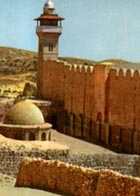 On the Heritage Trail
On the Heritage TrailTuesday, March 2, 2010 | Jewish Ideas Daily » Daily Features
Unlike Ariel Sharon, Prime Minister Benjamin Netanyahu did not have to take a stroll on the Temple Mount to provoke Palestinian Arab leaders into threatening mayhem. Instead, Netanyahu simply announced a comprehensive plan to strengthen Israel's national heritage by rehabilitating and preserving archaeological and historic sites, developing historic trails, and conserving photographs, films, books, and music of archival value. "A people," he declared, "must know its past in order to ensure its future." Unveiled on February 2, the plan was greeted with a yawn by the mainstream Israeli media, mixed with a few deprecating remarks about Jewish chauvinism, and was largely ignored by Palestinians....
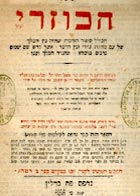 Yehuda Halevi
Yehuda HaleviMonday, February 22, 2010 | Jewish Ideas Daily » Daily Features
How golden was the Jewish "Golden Age" of Spain: roughly, the 10th–11th centuries C.E.? In the era's once-popular reputation for Muslim-Christian-Jewish tolerance and coexistence (convivencia), it is increasingly easy to see an overused and overstated fiction; more and more, scholarship reveals just how conflicted a time it was, and how conditional was the "tolerance" extended to minority communities. Still, for Jews as for others it truly was a period of amazing cultural creativity and accomplishment, all the more astonishing in light of convivencia's constraints. Under Muslim rule, the most innovative Jewish achievements lay in the realms of poetry and philosophy. Standing at the summit of both,...
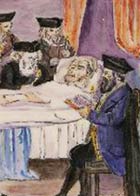 Holy Societies
Holy SocietiesFriday, February 19, 2010 | Jewish Ideas Daily » Daily Features
In the Hebrew calendar, Sunday February 21 is the seventh day of Adar, the date traditionally marking the death of Moses on Mount Nebo, overlooking Canaan, alone with God. The Lord's personal oversight of Moses' interment, in a place "unknown to this day" (Deuteronomy 34:6), inspired the rabbis of the Talmud to praise the act of burying the dead with dignity as an expression of true (because unrecompensed) kindness and indeed of imitatio dei, the injunction to follow God's ways. So it is that the seventh day of Adar is designated by tradition to honor the institution of the Hevra Kadisha, the "holy society"...
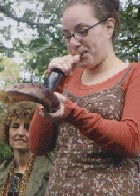 New Communities
New CommunitiesTuesday, February 16, 2010 | Jewish Ideas Daily » Daily Features
Recent years have seen a surge of new Jewish communities: experiments in communal living like Moishe House, urban kibbutzim in Israel's inner cities, back-to-nature programs combining organic farming, kashrut, and "eco-justice," and, perhaps most notably, independent minyanim in the U.S., Israel, and elsewhere. These last—communities focused principally or exclusively on prayer—shun not only the formality and organizational heft of most synagogues but also the labels and authority of denominational Judaism. Some of the most prominent have been created by Orthodox Jews seeking to make room for greater participation by women; others comprise young people experimenting with their own forms of...
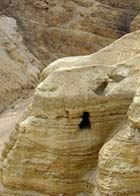 A Dead Issue?
A Dead Issue?Monday, February 15, 2010 by Elli Fischer | Jewish Ideas Daily » Daily Features
Since the electrifying discovery of the Dead Sea Scrolls at Qumran in the late 1940's, the scholarly consensus has been that they were produced by the Essenes, a small Second Temple-era Jewish sect known to us from Josephus. Last year, a book by Rachel Elior, Memory and Oblivion: The Secret of the Dead Sea Scrolls (Hebrew), upended this seemingly settled issue by contending that, in fact, the Essenes never existed. Elior's revolutionary thesis, argued with force and stridency, has been discussed in major mainstream publications from Israeli newspapers to Time magazine. But the controversy, and clashing assessments of her achievement as a historian, have...
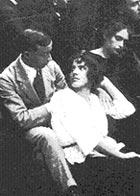 Eastern Europe
Eastern EuropeThe rediscovery—and recovery—of Eastern Europe are central elements in contemporary Jewish culture. Ultra-Orthodoxy tries to maintain versions of Eastern European dress, speech, and mores. The theology of Abraham Joshua Heschel, the melodies of Shlomo Carlebach, the sound of klezmer, the literary productions of authors as disparate as S.Y. Agnon and Jonathan Safran Foer: all in their distinct ways seek to find, in the murdered world of Eastern Europe, a source of living energy for the present. Not all succeed, and only the best display a grasp of the sheer complexity of the civilization they mean to retrieve and/or to reconstruct. In one impressive recent study, large swathes of...
 China
ChinaMonday, February 8, 2010 | Jewish Ideas Daily » Daily Features
Quite apart from the implications of China's growing influence in the global economy, China's politics, both domestic and foreign, clash directly with Western concerns in areas from democracy to the rights of individuals and minorities to (especially when it comes to Iran's race to acquire nuclear weapons) the security of Europe and the Middle East. China is also interested in the Jews. It has had diplomatic relations with Israel since 1992, and Jerusalem has risked Washington's displeasure to maintain its military ties with Beijing. And China's interest extends beyond Israel, to Jewish civilization as a whole. Chinese scholars and academics seek to...
 Holocaust Days
Holocaust DaysThursday, January 28, 2010 | Jewish Ideas Daily » Daily Features
Yesterday, Shimon Peres delivered an address, in Hebrew, before the Bundestag as Germany and other nations marked International Holocaust Day, commemorating the date in 1945 when Soviet forces arrived at Auschwitz. Israeli and American Jews conduct their own Holocaust remembrances in the spring, on the anniversary of the Warsaw Ghetto uprising. Ultra-Orthodox Jews, uneasy with the Zionist emphasis on force and resistance, hold their memorials on the tenth of Tevet, one of the traditional fast days for the destruction of the Temple. In short, the Holocaust remains as open to interpretation, reinterpretation—and misunderstanding—as is the hole it blew through all the history...
Editors' Picks
The Jewish Berber Queen Renée Levine Melammed, Jerusalem Post. Dahia al-Kahena, a powerful monarch and formidable warrior, may have tragically paved the way for the Muslim conquest of Spain in 711 C.E.
Why Jews Succeed Jerry Z. Muller, Project Syndicate. Social scientists tend neither to understand nor to appreciate how modern capitalism has been shaped by earlier cultural predispositions; they would do well to study the case of the Jews.
Pooling Genes Gianna Palmer, Forward.
A new scientific paper uses DNA to assert a genetic link between Jews and Africans—a link also attested by ancient Jewish tales of trade and other exchanges with sub-Saharan Africa.
Rembrandt's Jewish Jesus Stephan Salisbury, Inquirer.
Living in Amsterdam's bustling Jewish quarter, the mature painter determined that the true image of the Christian savior would be found among his neighbors.
Next Year in Worms Michael Brenner, H-Net.
The place where Rashi (1040–1105) studied and where the oldest European synagogue stood is now devoid of a Jewish community; but the memory lives on, if selectively.
Protestant Mishnah Amit Gevaryahu, Talmud Blog.
Can the ancient rabbinic code of law be studied on its own, apart from the commentaries, deliberations, and disputes of the Talmud?
The Peoplehood Fallacy David Breakstone, eJewish Philanthropy.
What the new communal emphasis on Jewish peoplehood misses: yes, Jews are a people—but only by virtue of their connectedness to the Jewish faith and to the land of Israel.
For Whom the Bell Tolls Associated Press. Did a tiny ancient golden bell, found near the Temple Mount and making a faint metallic clink, once adorn a priestly garment?
Cantors and Levites Jonathan L. Friedmann, Daily Rabbi. Five years of formal schooling may seem like a lot, but as with the Levites in the ancient Temple, the musical and Jewish training of today's cantors is a lifetime's affair.
The Agony of Greek Jews Aristotle Kallis, H-Net. A much-needed history of the Nazi destruction of the Greek Jewish community impressively records, as well, ongoing postwar efforts to sustain the remnants of collective existence.

